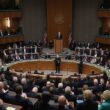The German Constitutional Court in Weimar has ruled that the state of Thuringia is legally justified in barring candidates who actively oppose the principles of a liberal democratic order from the preparatory legal service. The decision, issued Wednesday, effectively upholds a Thuringian law permitting exclusions based on perceived threats to the integrity of the judicial system, even if it means restricting professional opportunities.
The ruling follows a legal challenge initiated by the Alternative for Germany (AfD) faction within the Thuringian state parliament. The AfD had argued that the relevant paragraph of the law violated the state constitution and should be declared null and void. The court rejected this assertion, asserting that the potential disruption to the functioning of the judiciary outweighs the restriction on professional freedom.
The court emphasized that the actions demonstrating opposition to the liberal democratic order must be substantial and significant to warrant exclusion; mere political affiliation is insufficient. This clarification, while seemingly restrictive, signals a deliberate attempt to calibrate the law’s application, preventing overly broad interpretations that might stifle legitimate political dissent.
The decision sparks a broader debate surrounding the boundaries of political expression and professional qualifications within Germany’s legal framework. Critics, including human rights organizations, have expressed concern that the ruling could be exploited to silence dissenting voices and potentially politicize the judiciary. While the court’s reasoning centers on safeguarding the public’s trust in the judicial system, the implications extend to freedom of association and the potential for selective enforcement, requiring vigilant oversight of the law’s implementation and a continued discussion regarding its potential impact on fundamental rights. The AfD’s challenge and the court’s response, highlights the fragility of democratic institutions and the ongoing need to defend them against challenges from within and without.





